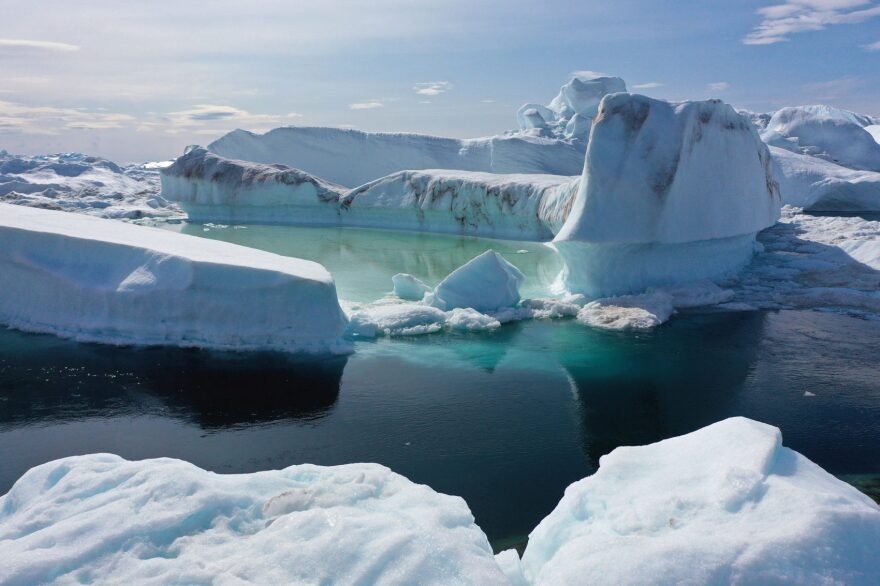In 2015, world leaders meeting in Paris to discuss climate change agreed to try to limit the increase in global average temperature to 1.5 degrees Celsius.
On Thursday, a report from the World Meteorological Organization, a United Nations agency, showed that the planet could exceed that watermark in the next five years.
"This study shows – with a high level of scientific skill – the enormous challenge ahead in meeting the Paris Agreement on Climate Change target," said WMO Secretary-General Petteri Taalas in a statement. The U.S. announced last year it would pull out of the agreement.
The report — which comes just weeks after a Siberian town hit a record temperature of 100 degrees — also notes that the last five years have been the warmest on record.
Kim Cobb, a climate scientist and professor at the Georgia Institute of Technology, says that 1.5 degrees of warming is "a line that was drawn in the sand" by the U.N. and world leaders because of the disastrous consequences that come with higher temperatures.
Beyond that marker, she says, "we're embracing a fairly large pile of risk, some of which we don’t understand very well. So bumping up against that threshold is really alarming."
Cobb also notes that for her and other scientists, there are clear parallels between the hesitant, uneven U.S. response to the COVID-19 pandemic and its sluggish response to climate change.
"Climate scientists have been watching this train wreck happen for several decades now," she says. "And this pandemic train wreck is very similar."
She says it's misguided to think that the country's pandemic strategy will sacrifice public health for long-term economic gain.
"What you are really doing is baking in long-term economic damage, and that is exactly what’s happening with climate change," she argues. "We are basically piling on a huge tab, growing by the year ... that will have long term and sustained damage to our economy."
Interview Highlights
On the climate risks we don't understand yet
"Well, we know that continued warming will bring some certainties to us. Rising seas, drier regions like Australia, California getting drier, more wildfire-prone, and some of those wetter areas being more susceptible to extreme precipitation, none of which is welcome. But some of the most scary kind of impacts longer-term have to do with potential accelerations in the kind of climate impacts that we could be bringing to our doorstep. Things that are kind of the surprises we might see, including real acceleration in a system that we would be unprepared for."
On whether this suggests the Paris agreement failed
"Well, obviously, we are letting 1.5 degrees Celsius slip through our fingers, despite the fact that as part of the 1.5 degrees target, there was an entire report that provides a roadmap for the nations of the world to bring that into reality. Fantastic detail. And also outlining what’s at risk if we set a new target for 2 degrees, let’s say, the next kind of round number, if you will, beyond 1.5. And that is what is most alarming is from a scientific perspective. We have the data, we have the knowledge, and, yes, we have not acted upon it."
On the steps to slow climate change
"Well, we still have time. And I think that’s the most important thing for people to understand about this, these kinds of scary reports that come out. And unfortunately, it’s just one scary report after another. We still have time. And what we have to do is get to net zero emissions by 2050. And we still have a couple decades to figure that out. But we have to get going on that pathway because it is quite a tall order. We need to grow the carbon sinks on our planet, stop deforesting the tropics and start moving in earnest to a low carbon energy infrastructure."
On parallels between the pandemic and climate change
"Unfortunately, the parallels for me are very stark. Climate scientists have been watching this train wreck happen for several decades now. And this pandemic train wreck is very similar. You’re sacrificing what you think is public health and well-being for short-term economic gain. But what you are really doing is baking in long-term economic damage. And that is exactly what’s happening with climate change. People are looking down the road at their next election or, you know, their next quarterly report. And we are basically piling on a huge tab – growing by the year – called climate change impacts that will have long term and sustained damage to our economy. The pandemic, of course, will have its own impacts economically for quite some time. And there’s no real escaping that. But with climate change, if we move purposefully in a data-driven fashion, we can actually have progress while growing our economy. And there are many different policy instruments to reach for to let that happen."
Francesca Paris produced this story and edited it for broadcast with Tinku Ray. Paris adapted it for the web.
This article was originally published on WBUR.org.
Copyright 2021 NPR. To see more, visit https://www.npr.org. 9(MDIxMDkyNjUxMDE0NDY1Njg1NzRiOTRiYQ000))





